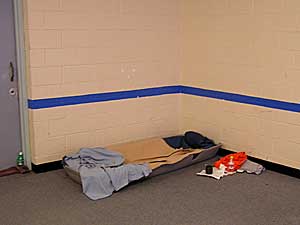|
Audio
Photos
|
March 7, 2005
 |
| Cots on the floor are a temporary solution to overcrowding at Tri-County Corrections in Crookston. (MPR photo/Dan Gunderson) |
Crookston, Minn. — The Tri-County Corrections jail in Crookston has beds for 81 inmates. These days, the jail is so crowded inmates are sleeping on the floor in the room where they usually watch television.
The scramble to find space for inmates is nothing new here. This jail has been at or near capacity for years. Like many overcrowded jails around the the state, the inmate population in Crookston exceeds what's permitted by the Minnesota Department of Corrections. The department works with counties to develop a plan to deal with overcrowding.
Tri-County security supervisor Andrew Larson, says the situation is stressful for staff and inmates.
"You can almost feel it when the tensions are starting to run high here. It sounds kind of corny, but it's the truth. Some days you walk in and you can just feel the energy," says Larson.
The Crookston jail is so crowded that on a typical day, from six to 18 prisoners will be sent to a jail in another county that has open beds.
It's getting harder to find open beds. Only a handful of jails in the state still have extra space. Jail administrators are on the phone every day trying to find those open beds. Last year Tri County Corrections paid other counties about $190,000 to house inmates in their jails.
A new jail for Crookston is in the planning stages. The facility will cost at least $17 million, according to Tri- County Corrections Executive Director Susan Mills. It's money most county officials would rather not spend.
"If you build a new library or a new school it becomes an important part of the community that people feel good about," says Mills. "But you don't feel very good about having to build bigger jails."
The jail in Crookston now has 81 beds while the new jail is expected to have room for up to 205 inmates. Susan Mills says with current trends, the new jail would be filled up within ten years. She says it may reach capacity much more quickly if the state legislature keeps shifting the inmate load to counties.
Mills points to two recent examples that she says significantly increased county jail populations.
The Minnesota felony DWI law meant more drunk drivers would spend time in jail. Last year legislation shifted so called short-termers from state prison to county jails. The change means people who violate the terms of their probation can be sent to jail instead of back to prison. That's helping ease a shortage of beds at state prisons. But the law change means on a average day the Crookston jail is housing nine so called short termers.
"We're paid $12.00 a day for our short term people. It costs me $55.00 a day to house prisoners in other jails. So it's certainly not a good proposition for local government," says Mills.
It's difficult to plan for future jail needs, says Mills, when one new law can dramatically change the equation.
Ottertail County Sheriff Brian Schlueter knows how quickly a jail can fill up. The new county jail built 17 years ago had 107 beds, many more than the county needed at the time. The plan was to help pay for the jail by renting extra cells to other counties.
Now the jail is at capacity, and Ottertail county needs to add at least 100 new beds.
The shortage of jail cells is not good for justice, says Sheriff Brian Schlueter. Ottertail county has arrest warrants for about 800 people. Schlueter says a new jail is expensive, but there's also a cost to letting people avoid punishment.
"Somebody will be sentenced a suspended sentence. (We'll say) 'If you do this again we're going to put you in jail.' Then they do something else and come back in and it's, 'If you do this again, we're going to put you in jail.' Well, they're running around with a couple of those, and they learn pretty quick that not all that much is going to happen," says Schlueter. "Are we holding people accountable and is justice sure and swift? Unfortunately, I think the answer to both is no."
Schlueter says county jails will continue to be jammed full until the legislature decides to address the statewide shortage of prison beds.





